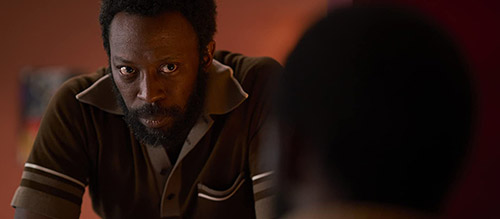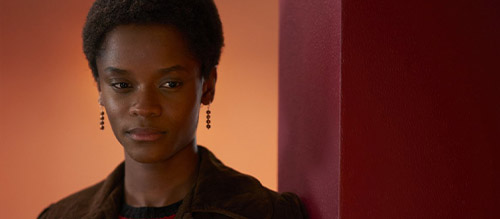Mangrove (2020) BFI LFF Review
Mangrove (2020)
Director: Steve McQueen
Screenwriters: Steve McQueen, Alastair Siddons
Starring: Shaun Parkes, Letitia Wright, Malachi Kirby, Rochenda Sandall, Gershwyn Eustace Jnr, Gary Beadle, Jack Lowden, Alex Jennings, Sam Spruell, Joseph Quinn, Jumayn Hunter, Richie Campbell
There is a scene in the new justice-fueled offering of world renowned director Steve McQueen (12 Years a Slave) in which the Mangrove 9 – a group of black people wrongly arrested and charged with riot and affray – walk, black in skin and in clothing, into a white-washed limestone court house, Shabier Kirchner’s camera panning from their relatively small presences at the foot of the building all the way up to its engraved signage that reads “Justice”, white-on-white, the paleness of the walls of this emblem of British moral standards coming to fill every inch of the frame. This pointed camera move signals a vast change both in terms of visuals and in terms of meaning as we exchange a shot of the oppressed for a shot of the oppressor, from the injustice of the personal story of the Mangrove 9 to the justice system reinforcing such, from a small group of minorities to the establishment that towers over them, and, more simply, from black to white. It is just one of quite literally dozens of moments in Mangrove (2020) – one of the five films in McQueen’s new anthology expressing the black experience as told to him through relatives and lived by him whilst growing up as a black man in the UK – that expresses the deep and layered artistic intention of its filmmaker, that brings together so many filmmaking tools to so richly communicate the mass injustice of the black experience throughout history, that expresses the profound quality of what is truly an exceptional film.
So titled after the real-life black-owned restaurant in Notting Hill, London, that served as a hub of cultural diversity during the 1970s and 80s, Mangrove hones in on the real-life experience of the restaurant’s owner Frank Crichlow (Shaun Parkes) and his pursuit of equality at a time of extreme racial prejudice. The target of racial stereotyping and abuse from police constables in his district, Crichlow’s small but lively restaurant unintentionally becomes a gathering place for his community and members of the UK’s Black Panther movement. After back-to-back raids by the police, each coming with little to no evidence to back up their extreme action, the community bonded by the Mangrove organise a pointed protest that concludes at the door of their oppressor, the police force. Outside the station, the group of lawful protestors are surrounded by and subsequently beaten and arrested by the police, leading to nine of them being taken to court on charges of riot and affray – these are the Mangrove 9. Led by Crichlow and Black Panther spokesperson Altheia Jones-Lecointe (Letitia Wright), the Mangrove 9 tackle the inherent racial prejudice of both the British public and the British judicial system in their attempts to prove their freedom.
There may have been a time in which McQueen toyed with the idea of titling this edition of his anthology “Notting Hill”, the film making an early point of gifting the famous London borough the picture’s only title card as it follows its protagonist through the area’s streets. It would have made for a pointed remark on the controversial white-washing of the Roger Michell-directed Notting Hill (1999), still the most famous (and most inexplicably all-white) representation of the area ever put to film. Yet doing so wouldn’t have been necessarily honest about the film’s intentions, which are as much a celebration of the warm and vivacious nature of the black lives involved as they are about the righteous anger of the oppressed towards their oppressor, the title of Mangrove more accurately representing the true focus of its narrative: the black people at its heart.
This is just one of the endless creative nuances that ensure there is no mistaking that this is a film made by a black man and entrenched in the collective experience of black people in the UK. Unlike many a mainstream movie that acts somewhat voyeuristically towards the community, or uses dangerous stereotypes and anchors characterisation in prejudice, Mangrove is simply more evolved, and this is expressed most greatly through how relevant it feels to the ongoing racial tension of today as well as the mass injustice seen in countries across the globe when it comes to the Black Lives Matter movement. Here, black people are stopped and searched at will, arrested upon the whims of individual police constables and are beaten for no reason other than the colour of their skin – a horribly relevant portrait of how little has changed in the fifty years between the events of Mangrove and our current environment. By this token, Mangrove has moments that are utterly terrifying and others that are genuinely upsetting, McQueen and company using juxtaposition to make impactful statements in the film’s early moments before heading down a more typically character-driven route.
The film runs at a slim two hours, yet each of the real people represented on screen are imbued with a genuine sense of humanity, the filmmaker dousing his project in a multitude of layers to make room for his actors to perform; and perform they do.
Shaun Parkes (The Black Emperor of Broadway) as restaurant owner Frank Crichlow provides a career-high performance, the vulnerability he portrays within his moments of bravery and anger being of the highest standard, awards recognition surely just around the corner for some of the most charismatic and exceptional work put to screen all year. In one moment where performance, script and directorial authorship merge, Parkes embarks on a holy tirade against his oppressor, inheriting the lyrical qualities of the great civil rights speakers as he waves his hands and passionately bangs against the door of a holding cell. He is lit from behind by the light of a narrow window that comes to swallow his silhouette, the controlled flailing of his hands expressing a guttural reaction that says “I can’t take this anymore” to the camera situated at around the height of his waist. It’s one of those moments that leaves you agasp, and in this case with no question as to the expert artistry you have just witnessed; a scene worthy of every “best of year” montage and as good as any cinema you’ll ever see.
Similarly, Rochenda Sandall (‘Black Mirror: Bandersnatch’) and Malachi Kirby (‘Roots’) are exceptional in their portrayals of Barbara Beese and Darcus Howe respectively, the former evolving from passionate and angry to vulnerable and terrified, with the latter evolving in the opposite direction, each expressing either end of their spectrum with as much class as they do their journeys between each. The big awards contender from the supporting cast will, however, be Letitia Wright as Altheia Jones-Lecointe. The British actor known by many for her role in Black Panther, has yet to turn 27, yet the sophistication of her performance in Mangrove is truly one of the film’s most exceptional and important puzzle pieces. As a public speaker and leader of civil rights action, Wright is given all the room to shine that she deserves, her character the focus of many of the film’s most emotional and poignant moments, Wright delivering in everything from the melodramatic art of the monologue to the nuances of self-doubt and abject fear.
Mangrove is a collaborative expression of injustice, the outstanding quality of these performances indicative of not only the immense quality of the filmmaking from script to screen but also the determination and willingness of all involved to express the anxieties and pain of their people. There are moments where the piece seems anchored by cliche or tropes of the courtroom genre, and the performances from some of the white actors seem like caricatures, but whether it be in colour, in set, in costume, performance, camera moves, blocking, characterisation, narrative or direction, Mangrove is overall an exceptional piece – a year-topping release.
Steve McQueen has been an industry-leading voice for over a decade now, and his return to British shores after back-to-back critical North American successes 12 Years a Slave and Widows is one that has to be welcomed with open arms, this harbinger of meaningful screen art further solidifying his legacy with Mangrove, truly one of the most important British films of the 21st century.
20/24



